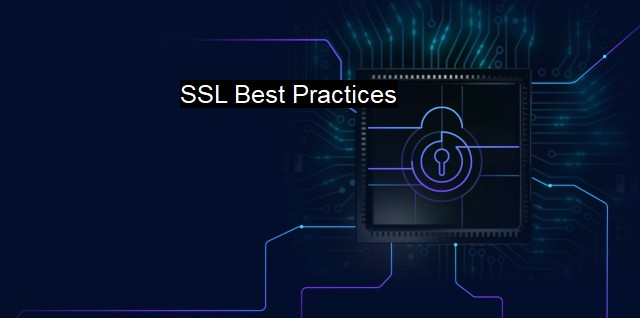What are SSL Best Practices?
The Vital Role of SSL Best Practices for Strong Cybersecurity and Trustworthy Communication Online.
Secure Socket Layer (SSL) is a protocol designed to maintain privacy between communicating applications and their users on the internet. When a server and client communicate, SSL ensures no one intercepts or tampers with the data during the transmission. By employing a mix of symmetric and asymmetric cryptography, digital certifications, and message authentication codes, SSL keeps an online connection secure, thereby preventing hackers and unwanted third parties from accessing, stealing, or damaging personal and sensitive data.SSL has become an absolute necessity in our heavily internet-dependent modern world. With the increasing threats of hacking and information breach, it is imperative to employ SSL best practices to protect and secure online communications. Ensuring a safe and privacy-protected environment is not only a primary concern for individuals but also for organizations operating within the cybersecurity and antivirus industry.
There are several SSL best practices that organizations and individuals can follow. One of the main practices is to always use the latest version of SSL - currently the Transport Layer Security (TLS) version 1.2 or 1.3. Older SSL versions have known vulnerabilities which can be exploited by hackers and must, therefore, be avoided.
One should also always opt for Extended Validation (EV) SSL certificates. EV SSL certificates are the highest grade and offer the maximum level of trust, security and authentication. This level of certification not only aids in improving web security but also helps encourage customer confidence by allowing businesses to display a sealed note of security on the website.
HTTPS (HTTP over SSL) is also paramount to web security. This protocol is a combination of HTTP and SSL to provide encryption and secure identification of servers. HTTP without SSL just means data transported over the network including the headers, client requests, and server responses, is sent in plaintext and could be intercepted and read by someone in transit. By embedding SSL, HTTPZS bestows encryption over the entire communication ensuring sensitive data like usernames, passwords, and credit card numbers are secure.
Another crucial practice is to keep all private keys associated with SSL certificates secure. If a private key is compromised, all the data encrypted with its corresponding public key can also be compromised. The key should be stored securely and access should be restricted.
Similarly, all SSL certificates should be kept updated. An expired SSL certificate can lead to a breakdown in communication, display untrustworthiness to customers, and allow attackers to potentially break the encrypted communication.
Encryption strength is another SSL best practice. The stronger the encryption used to scramble the data, the safer the communication, so all SSL encryption should be as strong as the user's system can manage.
Regular vulnerability or penetration testing is also pivotal to ensure continuous SSL security, especially for businesses that store a lot of client information. By routinely putting infrastructure to the test it becomes easier to identify any loopholes or weaknesses that may exist and to rectify them before they are exploited.
Lastly, training employees on SSL-related topics greatly reduces the risk of attacks. All personnel associated with handling SSL certificates, keys, and servers must be well-educated and well-informed about SSL best practices. In cyber-security, keeping oneself up-to-date is absolutely imperative and can defend an organization from many potential threats.
Adhering to these SSL best practices is of utmost importance in the field of cybersecurity and antivirus. Regardless of an organization's size, industry type, or specific security goals, following these protocols can greatly reduce potential vulnerabilities and attacks, instill trust amongst users or customers, thus enhancing both security and performance of their web presence.

SSL Best Practices FAQs
What are SSL best practices for cybersecurity?
SSL best practices for cybersecurity include using strong encryption protocols, implementing SSL certificates from trusted Certificate Authorities, regularly updating SSL certificates, and enforcing HTTPS connections on all web pages.How does SSL protect against antivirus threats?
SSL helps protect against antivirus threats by encrypting data that is transmitted between web servers and browsers. This makes it difficult for hackers and malware to intercept and steal sensitive information, such as login credentials or credit card numbers.What is the importance of SSL certificate validation for cybersecurity?
SSL certificate validation is important for cybersecurity because it confirms that the certificate is legitimate and issued by a trusted Certificate Authority. This helps prevent man-in-the-middle attacks, where an attacker intercepts communication between a web server and a browser and pretends to be the server. SSL certificate validation ensures that the browser is communicating with the intended server and not an imposter.What are common mistakes to avoid when implementing SSL best practices for cybersecurity?
Common mistakes to avoid when implementing SSL best practices include using weak encryption protocols, using expired or invalid SSL certificates, allowing mixed content on HTTPS pages, and failing to enforce HTTPS connections on all pages of a website. It is important to regularly review SSL configurations to ensure that they are up to date and secure.| | A | | | B | | | C | | | D | | | E | | | F | | | G | | | H | | | I | | | J | | | K | | | L | | | M | |
| | N | | | O | | | P | | | Q | | | R | | | S | | | T | | | U | | | V | | | W | | | X | | | Y | | | Z | |
| | 1 | | | 2 | | | 3 | | | 4 | | | 7 | | | 8 | | |||||||